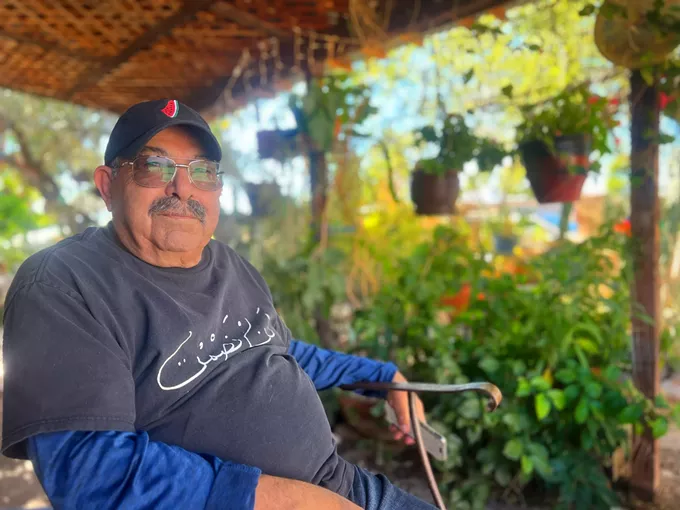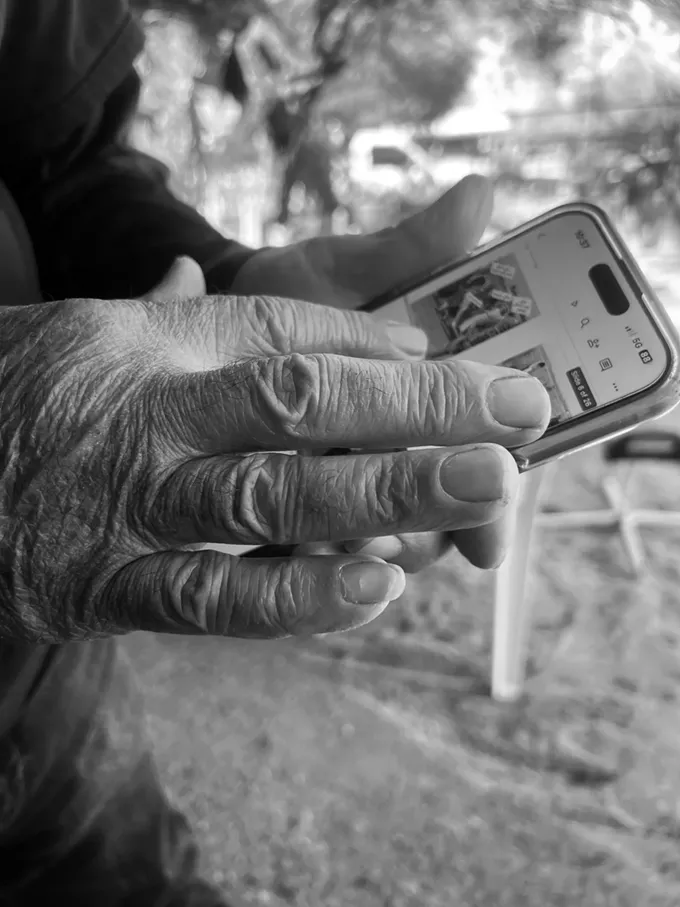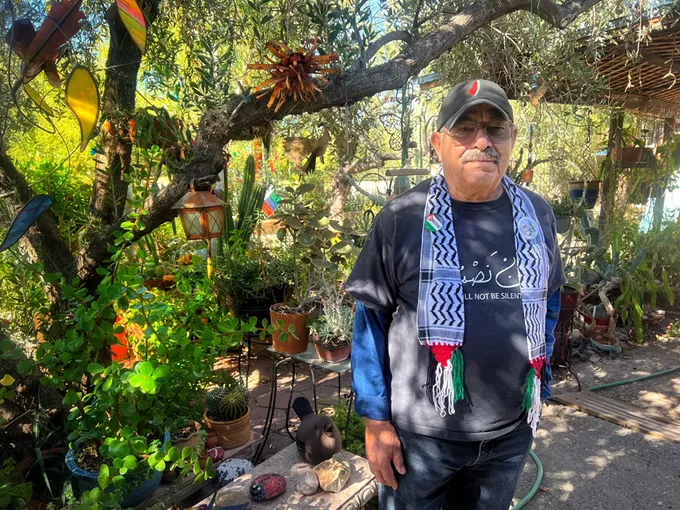
Mohyeddin Abdulaziz sets down his plant watering can and offers tea. He steps inside and returns with a Palestinian blend, Shay bil Maramiya. He grins, “it cures everything.” He places the two steaming cups down on a wrought iron table and settles into a matching chair. It is a sunny and breezeless November morning, and he sits in the front yard of his house, which isn’t a yard at all. It is a garden.
The entire home, front, back and sides, is enveloped in a botanical forest divided by footpaths and rich scents. The house is an anomaly in this working-class neighborhood on Tucson’s near-eastside. A little corner of paradise, where everything pulses with life, where everything breathes.
Mohyeddin is 77 years old, tawny skinned, gray mustache, aviator specs, blue jeans and baseball cap festooned with a tiny watermelon slice, signifying preservation of Palestinian freedom. His handshake is warm and strong, his grin a beam, and he moves, gestures and talks in an unhurried, measured way. His English floats in a slow Arabic accent, flattened vowels, and a rhythmic, sing-song intonation. It is surprising to learn he hits the tennis courts twice weekly, somehow goes against type. Yet his eyes transmit something unreachable by his words. It is tenderness, and sometimes something vulnerable. It is impossible to pinpoint any bitterness, which mirrors observations of him, and conversations with him. This is a Palestinian-born man, a father, grandfather and husband who has been a strident activist, and sufferer, for human rights, justice, equality, and peace, for much of his life.
“We had a lot of protests in Jordan, freedom and democracy, and,” he laughs, “all that stuff.” “Isn’t it funny that humanity has practically all the same issues, no matter where you are?”
When he talks of his homeland, he seldom conveys surprise or anger of the daily genocidal atrocities. But there is deep sadness, one he cannot wholly explain. This is not depression—he doesn’t get depressed— it is empathy, which, for whatever reason, he often veils with self-deprecation and laughter. Yet there is a scar that continues to rip open. It begins with a bloodline, his own.
“Understand,” Mohyeddin said, “that in Palestine, a village is like a family.” He means that fairly literally. Uncles and cousins and neighbors and shopkeeps and farmers and ....
“My family name is actually Abu Ghosh,” he said. That makes Mohyeddin a descendant of a prominent Palestinian family whose ties to the land ran 500 years deep, into local and regional history, and in the village of the same-named Abu Ghosh. The family had two branches, he said, one in his home village Imwan and one in nearby Ramallah. He laughs, “it is like the name Smith.” He has many family names, a way Palestinians maintain cultural identity and connection to the land and people, particularly during forced removals and invasions.

Author Jonathan Kuttab, a worldwide respected author and international human rights attorney, who practices in the U.S., Palestine and Israel, wrote succinctly about many who suffered and survived the WWII Holocaust: “Many brave Jews became world-class champions in working against racism and discrimination and for justice, human rights, international law and philanthropy throughout the world.” He writes how others, “were so filled with understandable bitterness and anger that they lost their faith in humanity.” Their explicable pain hardened into a relentless will to secure their own survival, even at the expense of others. As a result, they affixed themselves to the Zionist movement, set into motion by England in the ’30’s, and now with the aid of Jews fleeing post-Shoah Europe, the 1948 Arab-Israeli War broke out. Zionist forces carved an Israeli state from chaos, the Green Line cut through Palestinian lives, an armistice boundary drawn in the ash of villages.
In 1967, the Six-Day War rumbled into Mohyeddin’s family and village. “When that war broke out, there was no war,” Mohyeddin said. “The Israelis didn’t come with tanks, they came with bulldozers.”
Zionist forces flattened Mohyeddin’s hometown Imwas — a village older than memory, where it’s said Jesus walked after the resurrection — along with towns Yalo and Bayt Nuba, centuries of Palestinian life erased from the hills of Latrun near the West Bank border. These villages, caught in “no man’s land” between wars, became prime real estate for Israe l— a gateway to Jerusalem, long tended by Palestinian hands. Residents were given hours to gather belongings and flee on foot miles toward Ramallah, leaving lifetimes and histories buried under rubble.
His family was devastated. “My parents were home,” Mohyeddin said. “My older sister and brother, my younger brother, sister too. They went, my people. Many went to Jordan. They didn’t know what was going on. There were no phones, no buses.”
The war of borders caged lives.
Today, where Imwas once stood, an Israeli national park sprawls, a land scar—a war crime, ethnic cleansing, colonialism by any name.
Mohyeddin was in his dorm at the University of Jordan, “studying, classic English lit, like Chaucer,” which, even in this conversation, he shakes his head and laughs.
He lifts his phone and produces gray-toned photos of his hometown, points out his grandfather’s coffeehouse and bakery, his family home in the distance.
He denounces Hamas for its brutal October 7 attacks, but “it is important to recognize Oct. 7 is not the beginning of history.”
Raised Muslim, his father was “very devout” but open-minded politically. “Most of my friends were Arab Christians, and we celebrated all the holidays growing up, Christmas, too. I’m not a practicing Muslim, culturally yes, but we’re not a religious family,” he laughs. “My children found their own beliefs. I used to get teased about not being religious. Faith is personal. I don’t care what you believe, I care what you do. I love reading the Quran,” he adds. “There is not another text like it in Arabic. The Arabic language existed before the Quran, but the Quran became the language. It’s amazing.”
In high school, Mohyeddin hung on the progressive side of politics. Later, he and his college friends were part of the Palestinian left, acutely aware of issues of socialist equality, and “the hate of the ’60s and ’70s, Vietnam and all of that.” He did not grow up with a hatred of Israel at all, was always in favor of “a democratic secular state for Palestine, for Jews, Christians, Muslims, whatever. We were aware of Zionism and imperialism, we knew what happened to Jewish people was not good. Antisemitism led to the Nazi movement and the Holocaust. We are all victims of antisemitism as well.”
His truth is simple when so few have yet to mouth the words “genocide” and “ethnic cleansing” as it applies to the Zionists and Palestine. “We have to find a way to live together, but that happens when we are equal. We need justice for all.”

The shadows have shifted in the garden, the world around him an ecosphere away from Tucson. The frontyard where we sit is a kaleidoscope of hanging, potted and earthbound flora; sun streams light on dangling artifacts and bird feeders in whimsical pinks and blues; from columnar cacti to organic peppers and faint scents of various blooms surging upward; one heaving olive tree — a potent Palestinian symbol — serves as a centerpiece off the walkway to the front door.
On the yard’s northside, a treehouse-slide playground sits in a mini sand beach, ready for his grandchildren. It is dependable working peace, a personal therapy for Abdulaziz, using skills his father passed down (“we lived off the land. Farming was his main thing.”)
He pauses mid-conversation to point out a Monarch butterfly bobbling plant heads. The Monarch is a symbol of migration.
“The Palestinians after this holocaust are not getting support like the Jews after the Holocaust. It is unbelievable what our government is doing [supporting Israeli with billions of dollars in arms], and how much silence there is in this country.”
“I had a big mouth,” Mohyeddin said. Was always on the side of promoting peaceful political revolution. In the 1970 Jordanian Civil War, a fight over Palestinian autonomy and influence within Jordan, he was imprisoned and tortured because, “I was Palestinian. I was in my car going to my work place. There was no specific action [on my part]. And,” he adds laughing, “no specific charges.”
Two months in a tiny windowless cell but for a blanket and a light. An opening in the door for food. “They beat you. When you had to go to the bathroom, they interrogated you — and you need to go — and you tell them things that have nothing to do with the truth.”
He was deported to Syria and wound up in Lebanon. His older brother was working in Kuwait, which had a large Palestinian contingency. The Kuwaiti government granted Palestinians who fled their homeland (particularly after the ’48 and’67 wars), extraordinary asylum with rights and privileges, allowed for The Palestine Liberation Organization (PLO) to administer schools. “The Palestinians built Kuwait!,” Mohyeddin said, “with labor forces, doctors, teachers, professionals. We worked for three years starting schools for Palestinian kids,” he said. “It was a lot of fun. We thought of it as a mission.”
Enter Armaco, the largest oil producer in Saudi Arabia. He saw an ad for a job and applied as a lark. They flew him in for the interview. He was impressed (“I never had that experience, an interview with a big company.”) He got the job in the Industrial Training Center teaching English to Saudi employees.
“They hired me!” He was blown away.
“My friends thought it was a joke, this revolutionary, this activist working at a giant oil company. But you have to understand, for a young man to get that job—they paid me very well. I was able to help my family, siblings. I helped my parents build a house in Beitunia, Palestine.”
Mohyeddin met his future wife, Helen, in 1977 when she, too, worked for Aramco. They stayed together there for a few years until Helen decided to return to the University of Arizona, where she'd worked before. Her parents had retired to Tucson, and she wanted to be closer to them.
“People thought it was crazy to leave the company, all the income.” He adds, “Saudi Arabia is the most oppressive country on earth. When I decided to immigrate, it wasn’t for economic reasons. It took years here to earn as much as I was earning at Aramco.”
They landed at JFK, drove to Tucson, hit 21 states, camping along the way. He saw the country firsthand. In certain cities they’d take bus tours. “I’d stand up and say ‘I’m from Palestine,’ and someone would say, ‘you mean Israel.’”
“I wasn’t allowed to identify as a Palestinian until I got here. I put Jordanian when I applied for my U.S. passport. I put Palestine as my birthplace.”
The couple soon married. He met people in Tucson who introduced him to activism in the community. He was pretty shocked. When Israel invaded southern Lebanon in 1982, he attended a sizeable demonstration in Tucson. He thought, “All these people are American and they are for Palestine and Lebanon? That’s very good! I didn’t expect a lot of support in this country.”
Since then he has organized and spearheaded protests, signs, flags, been on myriad panels on the Israeli-Palestine conflict, taking on Zionists. He has brought authors and experts on the Middle East to town, is a fixture at protests, vigil processions to honor the martyrs. He has worked with many other organizations including Jewish Voices for Peace. Mohyeddin is a co-founder of both the Arizona Palestine Solidarity Alliance (arizonapalestine.org) and the Arizona Palestine Network (azpalnetwork.com), groups fighting for Palestinian human and political rights. He is a reason so much of what’s happening in Gaza is now heard. The other day he was in Nogales, Sonora, for the Border Patrol Victims Network, a day of remembrance, and solidarity in the shared struggle for justice. People I have talked to reveal that he is well-loved in the community, say the man is tireless.
“Being an activist is a healthy thing,” he said. “You are surrounded by people who understand you, support you, lift you up. Activism is really like exercise … it is very rewarding to someone’s character.”
He worked hard, two jobs, Director of Information Technology in the UA’s College of Law, and as Chief Information Officer in the Arizona Court of Appeals. He went back to school and learned computers in the early days, later developed one of the country’s first electronic filing systems and was recognized for the work. He studied political science and comparative politics at UA. He retired after 30 years.
In 1994, he traveled to the site of his hometown, in Imwas, with his two young daughters and wife. Where there was community, where there were houses and schools and cafes, there is now an Israel’s Canada Park. “We found the floors to our house. I was devastated inside, and numb.”
We tour the gardens surrounding the house, an absolute framework for sustainable practices, food, water power. Four giant water harvesting cisterns, solar electric and hot water systems, enclosed porches, organic compost and little greenhouse. The entire time he is framed in blooms: Peruvian aji peppers and adenium trees, pomegranate, fig and citrus fruits, Palestinian sweet lime, and “plants for justice” for Palestinian Land Day. There is so much about the man in these gardens. He believes you can upend hate through nonviolence, protest, and law.
“I never liked violence, [and] we can’t match Israel’s violence. I believe in non-violence for ethical and moral reasons. If what Israel is doing is war crimes, we cannot be engaged in the same. Sometimes it is difficult to maintain that thinking with the unimaginable killing and destruction Israel is doing. What kind of Jews will we have in Israel when this is all done?” He believes Israelis and Palestinians are forever linked, and have to learn to live together.
“Gardening is part of my therapy,” he continues. “I try to do things that sustain. My grandchildren give me energy (he’s off to pick two of them from school soon). I have gardening, community and family. It keeps me going.”
He paused, said, “I am not fearless. But I don’t get scared, or depressed. I have determination. I have endurance. I just never had a stomach for violence.”
He closes the wrought-iron gate to his driveway, housing an electric and a hybrid. The gate features a symbol of a peace dove as centerpiece. “It was forged by an Iraqi artist,” he said.
